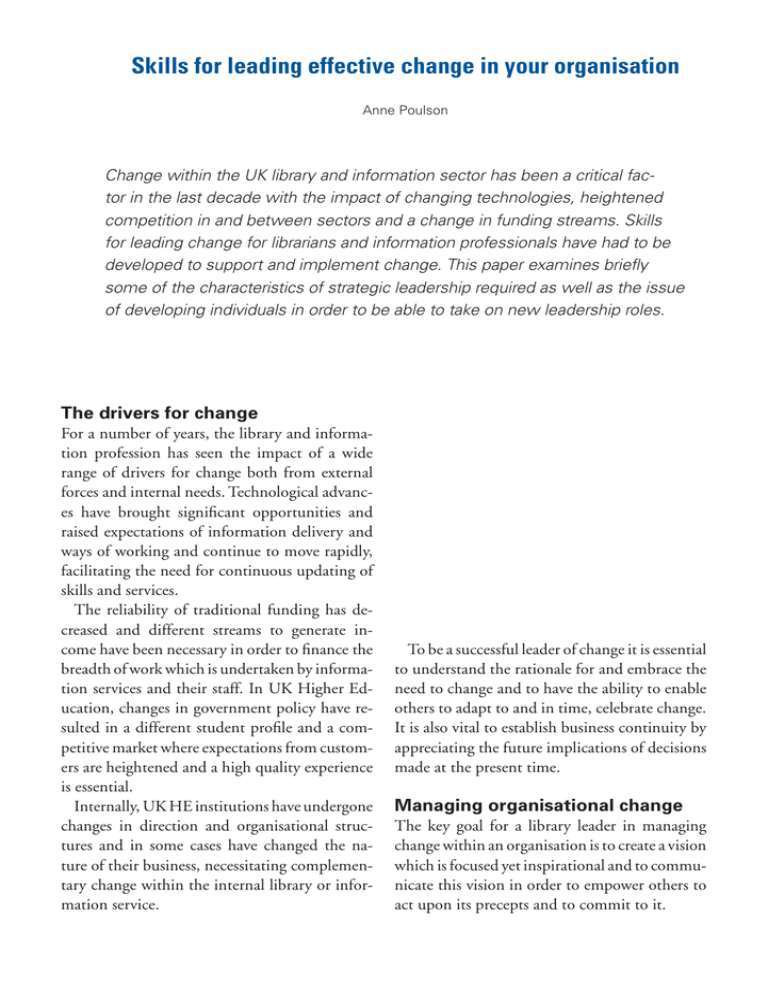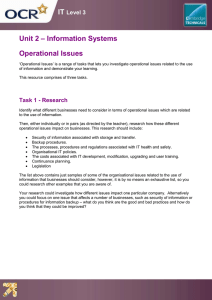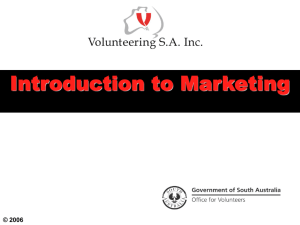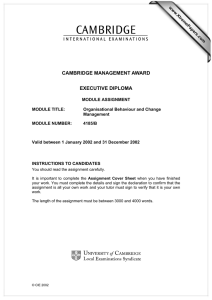Skills for leading effective change in your organisation
advertisement

Skills for leading effective change in your organisation Anne Poulson Change within the UK library and information sector has been a critical factor in the last decade with the impact of changing technologies, heightened competition in and between sectors and a change in funding streams. Skills for leading change for librarians and information professionals have had to be developed to support and implement change. This paper examines briefly some of the characteristics of strategic leadership required as well as the issue of developing individuals in order to be able to take on new leadership roles. The drivers for change For a number of years, the library and information profession has seen the impact of a wide range of drivers for change both from external forces and internal needs. Technological advances have brought significant opportunities and raised expectations of information delivery and ways of working and continue to move rapidly, facilitating the need for continuous updating of skills and services. The reliability of traditional funding has decreased and different streams to generate income have been necessary in order to finance the breadth of work which is undertaken by information services and their staff. In UK Higher Education, changes in government policy have resulted in a different student profile and a competitive market where expectations from customers are heightened and a high quality experience is essential. Internally, UK HE institutions have undergone changes in direction and organisational structures and in some cases have changed the nature of their business, necessitating complementary change within the internal library or information service. To be a successful leader of change it is essential to understand the rationale for and embrace the need to change and to have the ability to enable others to adapt to and in time, celebrate change. It is also vital to establish business continuity by appreciating the future implications of decisions made at the present time. Managing organisational change The key goal for a library leader in managing change within an organisation is to create a vision which is focused yet inspirational and to communicate this vision in order to empower others to act upon its precepts and to commit to it. It is important to understand the core values of the institution and to underpin these in recognition of “the way we do things here”. It is also important to develop and embed new approaches and to ensure that these new ways of working become institutionalised as well. Any changes and improvements that are made to the library and information service need to be consolidated within the culture and understood by the staff. A successful programme of managing change encompasses people in all parts of the organisation working together towards shared goals for the good of the institutional whole. The programme should also include the establishment of professional standards and behaviours and a shared understanding of what people expect from each other. In developing the most appropriate vision for an organisation, a leader needs to decide what the library and information service is here to achieve. What are the key priorities, both actual and potential, for its staff and users? What is affordable within the institutional context, including a methodology for obtaining and managing the necessary resources? It is important to remember that when dealing with organisational change, communication with and involvement of all stakeholders cannot be underestimated. A leader must be supportive, consultative and transparent about the change that is going to happen and the reasons why it is necessary, to avoid the adage that change is being undertaken for change’s sake. A change programme is a real opportunity to engage with the library and information staff and the wider community and to encourage collaboration and openness of ideas. Changing the culture does take time and it is vital to acknowledge this at the start of the process to all parties concerned. A leader cannot drive the change process alone. It is critical to identify and support change agents at all levels of the institution which can champion the vision publicly and provide impetus for the change to be implemented on the ground. Some staff may be more reluctant than others to embrace the changes taking place. It can be helpful to make “new blood” appointments, where possible, to bring outside and new perspectives and to benchmark one’s service against other comparable library and information services in order to learn from different experiences. To some, change is threatening and a leader must acknowledge this whilst having the confidence to take sometimes hard decisions but knowing which battles not to fight and building real rapport and engagement over the things that really matter. It is important have the courage of one’s own convictions and remain resilient but open and to combat negativity successfully. Full engagement in and explanation of the change process will ensure in the long run that the majority of staff will, with appropriate training, nurturing and encouragement, accept change. To quote Charles Darwin, “it is not the strongest species that survive, not the most intelligent but the ones most responsive to change”. Strategic leadership Whilst leadership and management are closely aligned, leaders tend to think long-term, be innovative, focus on people, prioritise core values and explore risks. Managers think short-term, are administrative, focus on structure, prioritise systems and contain risks. Leaders of organisational change need to be able to distinguish between the strategic and the operational and to concentrate on the former, developing priorities, changing the organisational philosophy and values and promoting new ways of working. In defining the qualities of strategic leadership, language tends to concentrate on an individual’s personal attributes and style. For example, the UK Leadership Foundation’s definition of leadership is “using our personal power to win the hearts and minds of people to achieve a common purpose”. Other terminology that is frequently used to describe good leaders includes the words motivating, innovating, inspiring, risktaking and resilient. Excellent interpersonal skills are crucial as individuals will need to be able to influence and communicate with a wide range of stakeholders, both internal and external and to exercise convincing and persuasive advocacy and marketing skills in order to achieve their vision. It is also essential that leaders have a good political acumen and an intelligent understanding of the wider organisational culture within which they are working. To be successful, change must be reflective of and attractive to the parent organisation’s direction and strategy and the LIS leader must be able to command influence at the highest level in order to raise the profile of the library or information service. In budgetary terms, libraries can be seen as part of “the administrative drain” on the organisation as costs are high and income generation opportunities are limited. Thus it is important to be able to demonstrate accountability, relevance of service and value for money in order to be successful in winning funding. Learning to lead Without debating whether or not leadership can be taught or is innate, it is clear that the most successful individuals are those who really want to lead. They have passion for the challenge, rather than simply having the knowledge to do it. In the UK library and information sector, there are serious recruitment challenges which are beginning to be addressed. In most cases, there has been a lack of joinedup long-term succession planning within organisations and demographic statistics demonstrate that a significant part of the current cohort of leaders will reach retirement age within the next 5-10 years. There is also a lack of available incentives for individuals aspiring to a leadership position. Significant salary increase is not always negotiable and mobility across the country is often not possible or desirable. It is also fairly unusual to move between sectors (academic, public, special libraries) or even groupings of particular libraries (for example, between the older research academic libraries and the newer more teaching-led libraries). However perhaps a more worrying issue is that there is a degree of disinterest from individuals in rising to the leadership challenge. To counteract this, it is essential that the leaders of today stimulate enthusiasm amongst and enable development opportunities for the next generation of LIS professionals. Potential leaders need to seize every opportunity at any level throughout their career to practise leadership skills which will encourage self-knowledge and self-confidence. Giving new professionals the chance to undertake different roles or to develop a transferable portfolio of skills will allow them to develop a range of management skills. This will enable them to be more flexible in their outlook and will give them the confidence to take on more challenging roles. It is important to develop supportive networks of like-minded colleagues beyond the institution in order to allow a safe but rewarding place where people can share new ideas and support each other in challenging situations. It is vital also to find key mentors who are good leaders from whom individuals can learn and be enthused. But often exposure to less successful leaders can be an even more empowering and useful experience and should be learned from in a positive sense. There is no one career path solution to becoming a good library and information leader of the 21st century. However, the importance of leadership and change management skills to the profession is recognised and has been invested in. This should encourage newer professionals to find out how rewarding leadership can be.& Anne Poulson, Librarian School of Oriental and African Studies (SOAS), University of London email. ap45@soas.ac.uk




